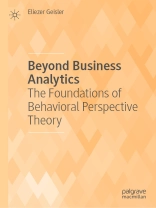This book explores the role that data analysis plays in the managerial decision-making process. The author presents the notion of ‘beyond analytics, ‘ which proposes that through data collection managers evaluate patterns in business processes through models of cognitive representation, framing and modeling, and knowledge creation in businesses. The book focuses on how the massive amounts of business data can be reduced to manageable volumes, thus allowing managers to make informed decisions. Further, it relates beyond analytics to HR aspects of the business and succession planning. This book will inform organizational behavioral theorists how the management of data impacts the decision-making process in organizations.
Mục lục
Chapter 1: The Notion of Business Analytics.- Chapter 2: The Notion of Beyond Business Analytics: Examples of Business Applications.- Chapter 3: The Concept of Beyond Business Analytics.- Chapter 4: Representations of Organizational Events.- Chapter 5: Illustrative Cases in Human History.- Chapter 6: The Power of the Few.- Chapter 7: Beyond Business Analytics and the Pursuit of World Peace.- Chapter 8: Beyond Business Analytics: How good products made by good companies fail in the marketplace.- Chapter 9: Beyond Business Analytics: How Good public organizations fail in their mission.- Chapter 10: The Road Ahead
Giới thiệu về tác giả
Eliezer Geisler is Distinguished Professor Emeritus at the Stuart School of Business, Illinois Institute of Technology, USA. He is the author and co-author of over 80 articles in refereed journals and a similar number of publications in professional and non-academic journals. Geisler is the author of a dozen books, including: Managing the Aftermath of Radical Corporate Reengineering (1997); Methodology, Theory and Knowledge in the Managerial and Organizational Sciences (1999); The Metrics of Science and Technology (2000); Creating Value with Science and Technology (2001); Installing and Managing Workable Knowledge Management Systems (2003, with A. Rubenstein), and Principles of Knowledge Management (2009).












